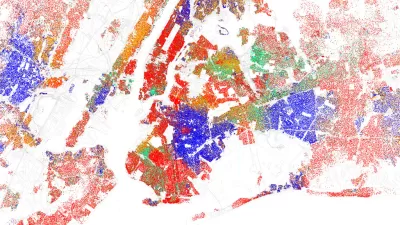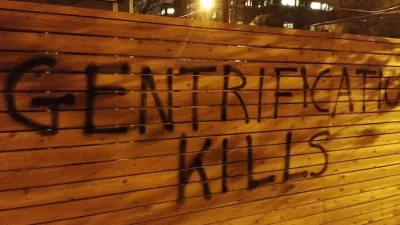In a appeal by no means limited to the Dallas metro region, Mike Koprowski condemns the city's entrenched segregation and calls for a stronger response.

Opportunity Dallas executive director Mike Koprowski takes a strong stance on segregation in Dallas. "Dallas is one of the most residentially segregated places in America, according to the Pew Research Center, with low-income families (disproportionately people of color) overwhelmingly clustered in areas of concentrated poverty [...]"
By income and by race, segregation has been linked to a whole host of urban problems. "We can downplay segregation by saying it's just a symptom of poverty, but segregation is a key driver of poverty because it spatially isolates families from critical assets, resources, transportation, institutions, employment opportunities and networks."
Koprowski points to research by the Metropolitan Planning Council in Chicago, which found that "less segregation can lead to a more balanced property tax base and higher city revenue; better school outcomes and an enhanced workforce pipeline; economic growth and increased productivity; improved safety and lower policing and correctional costs; and a more balanced consumer base across the city."
School and housing policy are some places Koprowski sees as ripe for reform. "The most important thing we can do to reduce concentrated poverty and segregation is to adopt a comprehensive housing policy (which we've never had) that incentivizes and promotes more mixed-income and affordable housing throughout the entire city."
FULL STORY: Segregation in Dallas is a poverty trap

Planetizen Federal Action Tracker
A weekly monitor of how Trump’s orders and actions are impacting planners and planning in America.

Maui's Vacation Rental Debate Turns Ugly
Verbal attacks, misinformation campaigns and fistfights plague a high-stakes debate to convert thousands of vacation rentals into long-term housing.

Restaurant Patios Were a Pandemic Win — Why Were They so Hard to Keep?
Social distancing requirements and changes in travel patterns prompted cities to pilot new uses for street and sidewalk space. Then it got complicated.

In California Battle of Housing vs. Environment, Housing Just Won
A new state law significantly limits the power of CEQA, an environmental review law that served as a powerful tool for blocking new development.

Boulder Eliminates Parking Minimums Citywide
Officials estimate the cost of building a single underground parking space at up to $100,000.

Orange County, Florida Adopts Largest US “Sprawl Repair” Code
The ‘Orange Code’ seeks to rectify decades of sprawl-inducing, car-oriented development.
Urban Design for Planners 1: Software Tools
This six-course series explores essential urban design concepts using open source software and equips planners with the tools they need to participate fully in the urban design process.
Planning for Universal Design
Learn the tools for implementing Universal Design in planning regulations.
Heyer Gruel & Associates PA
JM Goldson LLC
Custer County Colorado
City of Camden Redevelopment Agency
City of Astoria
Transportation Research & Education Center (TREC) at Portland State University
Jefferson Parish Government
Camden Redevelopment Agency
City of Claremont





























